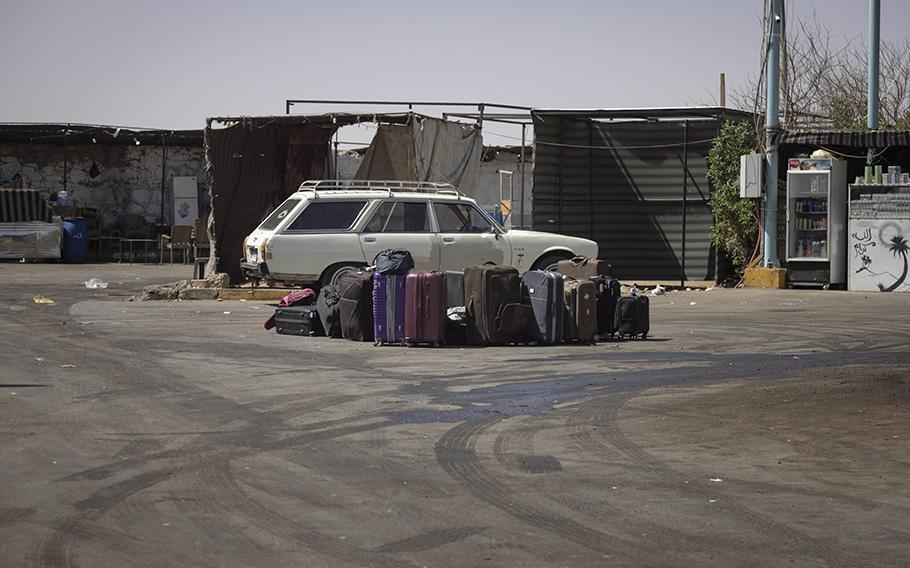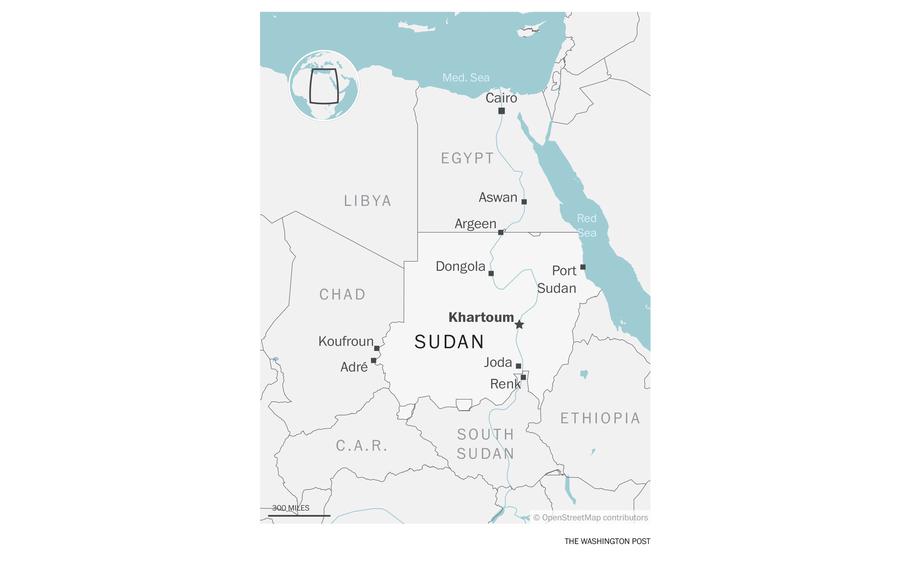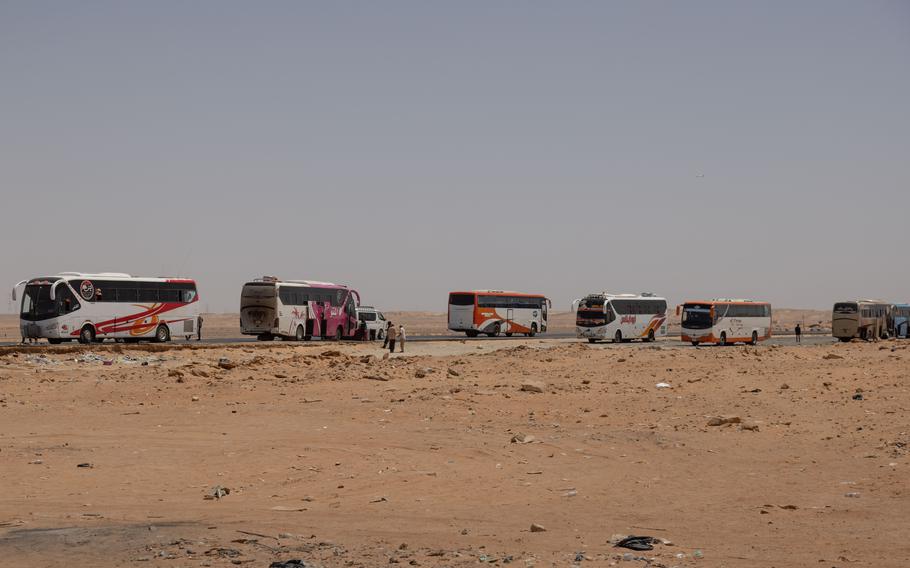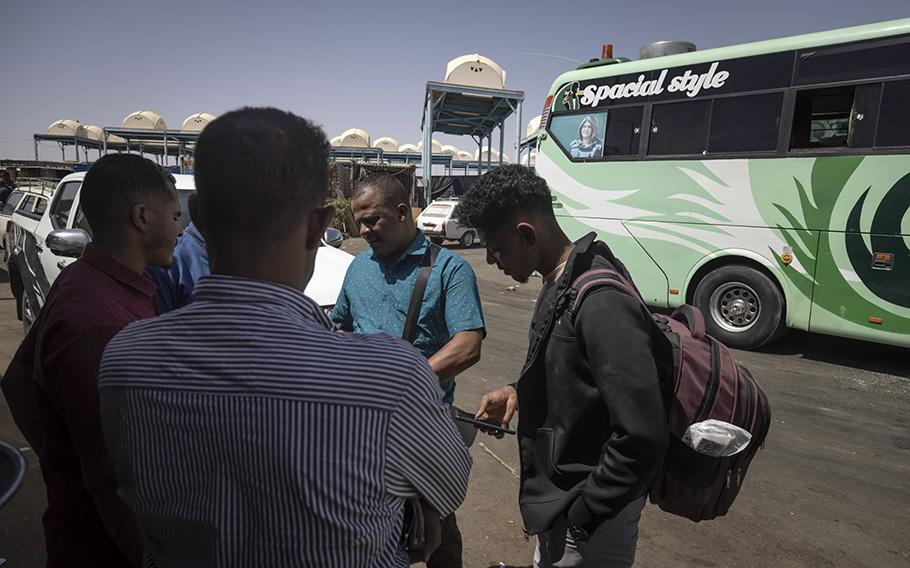
Luggage at a bus stop near Aswan, Egypt, on April 27, 2023. Some Sudanese who can afford the trip are traveling to Egypt to escape the conflict at home. (Sima Diab for The Washington Post)
WADI KARKAR, Egypt - The Sudanese family hid under a bed as a rocket slammed into their roof - and again when militia soldiers stormed in and looted their house. They rationed water, held their noses to avoid the stench of abandoned corpses on their street and said their goodbyes, fearing they would not make it out alive.
After more than a week of hellish conditions in Khartoum, they finally fled by bus to Egypt, hoping their ordeal would soon be over.
What they found at the border was more chaos.
For four nights, the family and other passengers slept on the street near the Argeen border crossing, first on the Sudanese side and then in Egypt, surviving with hardly any food or water in intense heat.
They had no access to electricity or proper bathrooms as they waited for their passports to be processed by Sudanese and Egyptian authorities. Several times, the border guards took long breaks from processing anyone at all, they said, even as more and more buses pulled in, carrying thousands of others running for their lives.
At least one person died on the Sudanese side while waiting and another went into labor, they said. Many others fell ill. The family's 20-year-old son, who hoped Egyptian entry rules requiring visas for Sudanese men between 16 and 50 would be lifted because of the conflict, was denied entry. He had to travel to another part of Sudan to visit an Egyptian consulate and has still not received a visa.
"It was a disaster," said the father, Khalid, 60, an engineer who fled without his phone or luggage and was one of many Sudanese civilians waiting at a bus stop in southern Egypt on Thursday. "So many people fainted."
Like others in this story, he spoke on the condition that only his first name be used because of concerns over his safety in both countries.
Khalid and his wife are among at least 14,000 Sudanese civilians who entered Egypt in the past week - tens of thousands of others have fled to South Sudan or westward into Chad - braving dangerous roads and dozens of checkpoints, only to find themselves in another humanitarian crisis. Many here are from Sudan's most elite families and own property in Egypt, which has deep social and cultural ties with its southern neighbor. Cut off from their bank accounts, though, they are already running out of money.

()
Millions of others are still trapped in Sudan by fighting between forces loyal to Gen. Abdel Fattah al-Burhan, the army chief and de facto head of state, and those backing his rival, Gen. Mohamed Hamdan Dagalo, the leader of the paramilitary Rapid Support Forces. Multiple cease-fires have been announced since the conflict broke out two weeks ago, but none has held. At least 450 people have been killed, although the true toll is likely to be much higher. While countries and international organizations have rushed to evacuate their citizens and employees, many locals have no way out of Sudan.
The bus to the border cost around $350 per seat, families said, up from $50 earlier this month, and prices are still rising. The vast majority of Sudanese cannot afford to escape the country and so are left to shelter in Khartoum or flee to rural areas.
The ones fortunate enough to make the journey north to the border with Egypt said there was no sign of the United Nations or any other refugee agency. The only humanitarian group on-site was the Egyptian Red Crescent, which lent travelers phones and handed out water.
Spokeswoman Christine Beshay of the U.N. refugee agency in Egypt said the organization was "supporting those in need with lifesaving relief items that will be delivered through the Egyptian Red Crescent teams at the borders." A spokesman for Egypt's Foreign Ministry did not immediately respond to a request for comment about the situation at the southern border.
At the bus stop outside the Egyptian city of Aswan, some Sudanese travelers finally had a moment's reprieve - napping on plastic chairs, sipping tea and using makeshift bathrooms to freshen up before boarding new buses bound for Cairo or other cities.
Khalid's relative Aya, 21, an international relations student in Khartoum, said it had been days since she last urinated, because of a lack of facilities at the border. Other women said the only choice was to relieve themselves in the same streets where they slept.
Shahd, 33, an architect, fled with her husband and their three children, including an 18-month-old, after a rocket landed in front of their house.

Buses outside a bus stop near Aswan, Egypt, on April 27, 2023. Some Sudanese who can afford the trip are traveling to Egypt to escape the conflict at home. (Sima Diab for The Washington Post)
When they finally reached the border, "there was no water, no food, nothing for the children," she said. Her children feared urinating in public and had not relieved themselves for several days, and they had eaten nothing but chips, she said.
"If this happened again, I would stay [in Khartoum]," she said.
Ali, 62, said one of his family members had fainted and been revived. The process at the border was "not efficient at all," he said, describing the conditions as dehumanizing. "I saw people eat from the trash."
Witnesses said the long delays were caused by bureaucratic hurdles on both sides of the border. Exhausted and confused by the wait, some Sudanese got into screaming matches with Egyptian officials, they said.
Many young men secured their costly seats and made the lengthy trip only to learn that Egypt would not make exceptions to its visa requirement for male travelers between the ages of 16 and 50.
Those men and boys would have to turn around, passengers recalled border officials saying, and apply for entry permits in other towns - a journey that at wartime rates could cost hundreds if not thousands of dollars more.
The separations were wrenching for families that had survived intense violence in Sudan and could see Egypt just over the crossing but had to leave their sons behind.
"Their mothers sobbed and sobbed," Khalid said.
At least six members of his extended family, including his son and Aya's brother, were among those denied entry to Egypt and told to apply for visas elsewhere in Sudan. "We don't know if they'll get them or not," Aya said.
In Aswan, Ebtisam Babaker, 51, a single mother who traveled with another group that reached Egypt on Tuesday, wept as she described how her two sons, Youssef, 21, and Khaled, 19, were turned back. She wanted to stay with them, but they insisted that she continue with the other passengers - she is diabetic and they could not guarantee her safety. Now, they've run out of money and are still waiting for visas.

Sudanese nationals fleeing the fighting at home reach a bus stop near Aswan, Egypt, on April 27, 2023. (Sima Diab for The Washington Post)
"I have no one else but them in the world," she said. "We left everything behind."
Esraa Bani, 39, a Sudanese American based in the United Arab Emirates, waited at the bus stop in Wadi Karkar on Thursday, preparing to travel south toward Egypt's border with Sudan to distribute food, water and diapers to new arrivals.
As the international community rushed to evacuate its citizens from Sudan, no one seemed to be thinking about the Sudanese, she said. "They literally left the whole nation [of Sudan] on its own," she said. "The vulnerable people funded their own evacuation, and they're stuck at the border funding their own water."
Aya, the student, is struggling to process her new reality.
She woke up in Khartoum on April 15 to "bombs and fire." Bullets struck her house. They had no water or electricity for five days. It would be different at the border, she had hoped.
"I keep thinking it's going to be done, but it's never done - even until now," she said. "It's getting worse."